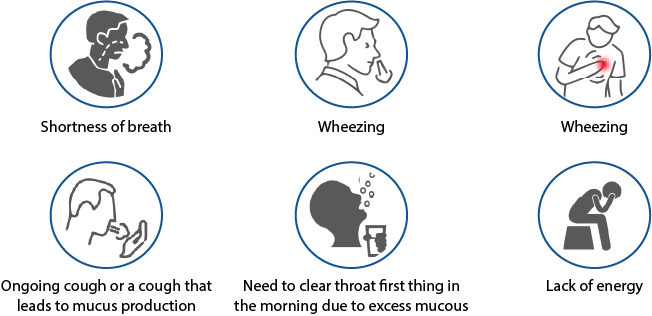
COPD
What is COPD?
- It is a lung problem wherein the airways in your lungs become inflamed and thicken, and the tissue where oxygen is exchanged is destroyed. The flow of air in and out of your lungs reduces. This makes it harder for you to breathe. Thus, the disease is characterized by increasing breathlessness and cough. It is a non-communicable disease and it cannot be passed on or spread to other people who live with the person suffering from COPD.
- Though the condition cannot be completely treated but the good news is that it can be managed effectively with medication & exercise. You can achieve good quality of life and symptom control.
What are the symptoms of COPD?
- The main cause of COPD in developed countries is cigarette smoking.
- In other countries besides tobacco smoking, the other cause is inhaling fumes from burning coal/wood for cooking in poorly ventilated homes.
- Occupational and environmental exposures to chemical fumes, dusts, and other lung irritants
In a very rare case a genetic disorder that a person is born with can cause COPD even when the person has not smoked and is not exposed to any lung irritant.
What the common risk factors of COPD?
The common symptoms of COPD, which may vary from person to person are:

What are the common risk Factors of COPD?

What is exacerbation of COPD? What are its symptoms?
Exacerbation of COPD is an acute increase in symptoms beyond normal day-to-day variation. The range of symptoms of an exacerbation include from increased breathlessness accompanied by cough and sputum production in mild COPD to life-threatening respiratory failure in severe COPD. Bacterial infection is frequently involved in exacerbations.
How is COPD diagnosed?
Your doctor will diagnose COPD on the basis of your signs and symptoms, your medical and family histories, and test results. Your doctor might ask you to take spirometry test which is the most common pulmonary function test. He/ She will examine you and using a stethoscope listen for wheezing or other abnormal chest sounds. He/ She may also recommend one or more tests to diagnose COPD. Spirometry is used to confirm the diagnosis of COPD in a suspected case. It is done using a spirometer, which is a small machine with a cable attached to a mouthpiece. It is a test which measures how much air you inhale and exhale in one forced breath and also how quickly you exhale.


